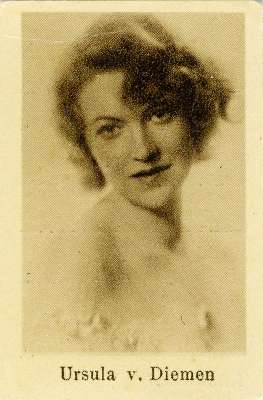
Ursula van Diemen
DE
Classical
Ursula Van Diemen (1897 -1988) was born in Schwerin in northern Germany, her father was Dutch and her mother German. She studied singing under Selma Nicklass-Kempner, Lola Beeth and Louis Bachner in Berlin. She married Justus Wilhelm Meyerhof, the owner of a textiles company and gave birth to daughters Eva Maria (1922) and Irene (1924) in Berlin. Sadly, all of the family possessions were seized by the Nazis after the rise of Hitler during pre-World War II Germany and the company was forcibly liquidated in August 1938. Her husband, a Jewish descendant, was persecuted and forced into a labor camp near Sachsenhausen, Germany, where he was listed in Dec 16, 1938. With the help of family, he was released, but kicked out of Germany, leaving Ursula and her daughters behind. In 1938, she moved with her daughters to the peninsula Höri by Lake Constance, a refuge for numerous artists during the period of National Socialism. Concert singer In 1918 she made her debut as a concert singer in her hometown, and and it was through concerts she made a name for herself, both at home and on tour in the Netherlands, England, Sweden, Latvia and Switzerland. She held several concerts in Frankfurt am Main with the renowned Swiss pianist Edwin Fischer. Van Diemen was mainly a concert singer, and was rarely seen on the opera stage. One exception was when she was in Max Reinhardt's staging of Jacques Offenbach’s La belle Hélène in Berlin in 1929. Gramophone recordings Ursula van Diemen reached a bigger audience through her gramophone records, and one special recording in particular would become legendary: her performance of Wolfgang Amadeus Mozart's Laudate Dominum from Vesperae Solenne the Confessor (K.339), recorded for HMV in 1928 with the Berlin Philharmonic Choir under the direction of Siegfried Ochs. The record received rave reviews, both from critics and record collectors, as in Gramophone magazine, the reviewer wrote: "I cannot give the performance of Ursula Diemen, a fine lieder singer who has recorded before, sufficient praise. Her lovely even tones, her artistic restraint, and the choral background, make one of the finest, most satisfying pieces of recording I have listened to for a long time. The recording is first rate. (May, 1935)" A letter from a reader states: "He [the reader] hopes, too, that Ursula Van Diemen (with the Berlin Phil. Choir) will continue records post-war; her existing "Laudate Dominum" (Mozart) being 'sheer perfection." LINDSAY W. A. Coox (Glasgow) December 1943" But despite the reader's hopes, van Diemen disappeared from the spotlight after the war. She was also an actress, featuring in the films Der Andere (1930), Ich bei Tag und du bei Nacht (1932), Der Polizeibericht meldet (1934) and Ein seltsamer Gast (1936) She sang in Frankfurt am Main on April 7, 1943, at a concert of the NS-organization "Kraft durch Freude" in Saalbau with the Konstanz Streichquartett, and the well-known film actor Albrecht Schoenhals. She worked as a vocal coach in Stuttgart until 1946, but after that little is known about what happened to her. In 1965, she was present at the first communion of her granddaughter Tina. Maternal grandmother of Florian Schneider.
Discography
| Title | Artist | Year | Type |
|---|---|---|---|
| Ave Maria / Laudate Dominum | Ursula van Diemen | Single |
